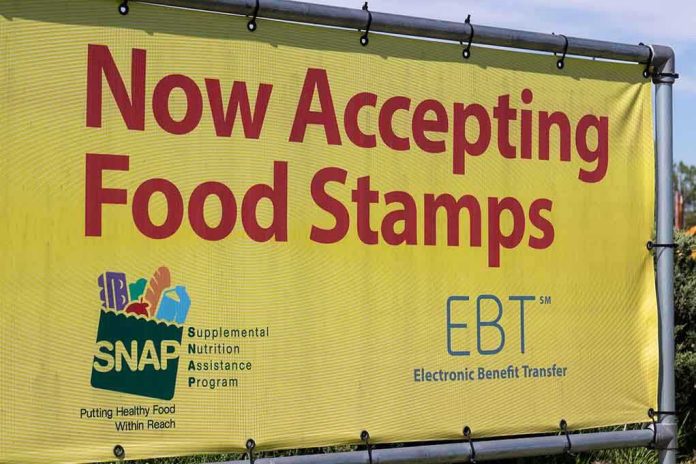
Claims that undocumented immigrants are draining taxpayer dollars through SNAP are resurging—despite new federal crackdowns and a lack of evidence for widespread abuse.
Story Snapshot
- Undocumented immigrants remain ineligible for SNAP under both historic and current law
- The 2025 One Big Beautiful Bill Act further restricts benefits for lawfully present noncitizens, not undocumented immigrants
- No credible evidence supports claims of rampant SNAP abuse by undocumented immigrants
- The main impact of recent changes falls on refugees, asylees, and humanitarian immigrants
Eligibility Rules: Who Can and Cannot Access SNAP
Since the 1996 welfare reforms, undocumented immigrants have been ineligible for the Supplemental Nutrition Assistance Program (SNAP), with benefits strictly reserved for U.S. citizens, lawful permanent residents, and select humanitarian cases such as refugees and asylees. The law requires rigorous status verification, using federal systems like SAVE, to ensure only eligible individuals receive benefits. Claims that “illegal aliens” are widely exploiting SNAP ignore these longstanding restrictions and verification measures.
The 2025 One Big Beautiful Bill Act, championed by the current administration, introduced even tighter limits on noncitizen eligibility. Many lawful immigrants, including vulnerable groups like refugees, asylees, and survivors of trafficking, now face exclusion or additional waiting periods. These changes reflect a broader push to limit public benefits and reduce government spending, but do not expand SNAP access for undocumented immigrants. Instead, the law removes previously eligible noncitizens from the program, a move that some states have implemented with confusion and inconsistency.
Persistent Myths vs. Federal Data: The Real SNAP Landscape
Despite frequent headlines and social media claims, there is no credible evidence that undocumented immigrants are systematically abusing SNAP. Federal audits, independent research, and data from the USDA confirm that most recipients are U.S. citizens or lawfully present immigrants who meet strict criteria. The narrative of “illegal aliens milking SNAP” conflates lawfully present noncitizens—who have historically had limited access—with those who are in the country unlawfully. This misrepresentation fuels political frustration but does not reflect program realities.
Fraud prevention measures remain robust. States and agencies use federal databases and documentation requirements to verify eligibility at enrollment and during periodic reviews. While isolated incidents can occur in any large program, there is no substantiated pattern of undocumented immigrants receiving SNAP benefits at scale. Program integrity remains a key concern for officials, but the greatest recent changes have primarily impacted humanitarian immigrants, not the undocumented population.
Consequences for Families and Local Economies
The most immediate effect of the 2025 SNAP eligibility changes is the loss of food assistance for thousands of refugees, asylees, and other lawfully present immigrants. Advocacy groups and local agencies report rising food insecurity, especially in communities where SNAP was a lifeline. The economic ripple effect extends to local grocers and farmers who depend on SNAP-driven sales. Food banks and charities are seeing increased demand as families lose access to federal support. Some states, confused by changing federal guidelines, have applied rules inconsistently, further compounding hardship for affected residents.
it's frustrating to see hard-earned tax dollars going to support people who are in the country illegally or perfectly capable of working.https://t.co/xMbgLw3whw
— @ftmyersguy64 (@ftmyersguy64) November 3, 2025
While supporters of tighter eligibility argue these measures protect taxpayers and restore program integrity, the burden of these changes falls not on undocumented immigrants but on legal residents and humanitarian cases. Political battles over immigration and welfare policy have intensified, but the facts remain clear: undocumented immigrants are excluded from SNAP by law and by practice. The debate underscores the need for clear, fact-based discussion rather than rhetoric that misleads or stokes division.
Sources:
OBBB Alien Eligibility – USDA FNS
SNAP: A Survival Lifeline for Refugees and Immigrants Will End on November 1
Immigrant Program Eligibility – USAFacts
Illegal Immigrants Be Hit Hard as SNAP and WIC Benefits Expire – CIS
Fact-checking Immigrants’ Health Care and the 2025 Tax and Budget Law – NILC
How Many NJ Residents Are on SNAP – NorthJersey.com














